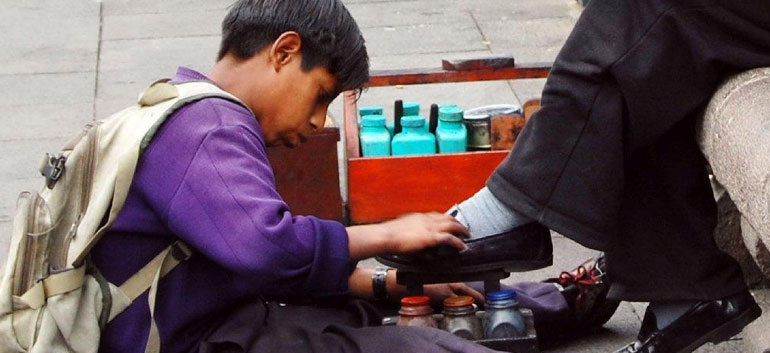Colombia made “significant advances” in its attempts to combat child labor in 2012, according to a report published by the United States Department of Labor (DOL).
The 12th edition of the DOL report ‘Findings on the Worst Forms of Child Labor’, published on Monday, upgraded Colombia’s response to the issue from category 3, “minimal advancement,” to category 1, “significant advancement.”
The report highlighted the government’s amendment of the Labor Code, which included increasing fines for labor violations “substantially” – from up to 100 times to 500 times the minimum monthly wage – and conducting “1,638 inspections to verify labor conditions for adolescent workers”. It also commended the conditional cash-transfer program ‘Families in Action’, which aims to bring people out of poverty using cash incentives.
However, the DOL report did point out that a lack of coordination between agencies continues to hinder attempts to reduce illegal child labor in Colombia, and that children are still being foribly recruited into armed groups and made to do hazardous activities in agriculture and street work.
What is child labor?
Child labor is defined by the International Labour Organization (ILO) as work that is “mentally, physically, socially or morally damaging and harmful to children” and/or significantly interferes with their schooling.
Colombia’s law sets the minimum age for work at 15. While minors between 15 and 17 are allowed to work, but require permission from authorities who check that the minor isn’t subjected to dangerous working conditions.
According to the DOL report, 752,526 children between the ages of 5 and 14 were engaged in child labor in 2012. While a June report by Colombian statistics agency DANE estimated that in total 1.1 million minors were working illegally.
MORE: More than 1 million children in Colombia subjected to child labor
Working on the streets, in mines, in homes and as child soldiers
The DOL report stated that in Cali, Colombia’s third-largest city, 60,000 children work on the streets. They could be begging, garbage scavenging, selling products or even engaged in prostitution.
In other parts of the country children work in the emerald, gold, clay, and coal mines, where they typically spend long hours exposed to toxic gases, explosives and “dangerous chemicals such as nitric acid.”
Rural and indigenous families “often send their children to urban households to become domestic workers.” These children are vulnerable to physical and sexual abuse.
Indeed, indigenous children appear to be particularly vulnerable to exploitation. The report specifies that members of the Wayúu, Kankuamo, and Wiwa communities have been used to smuggle gasoline into Colombia from Venezuela, and a 2012 report on child soldiers recruited by armed groups found that an indigenous child is 674 times more likely to be affected or recruited by such groups than a non-indigenous child.
The DOL report states that, in total, between 11,000 and 14,000 children act as combatants in armed groups. Last year the Colombian Institute for Family Wellbeing (ICBF) removed 482 children from these groups, and launched the “Healthy Generation” campaign to protect hundreds of thousands of vulnerable children from being recruited.
The Unit for Justice and Peace, part of the Prosecutor General’s Office, recently released a 60-page report stating that of the 5075 child soldiers who demobilized from illegal organizations between 1992 and 2012, 59% belonged to the country’s main rebel group FARC, who are accused of systematically recruiting children to fill their ranks.
MORE: FARC systematically recruits child soldiers: Study
Cash incentives for good parenting
Another program set up by the government aims to reduce extreme poverty. ‘Families in Action’ offers cash subsidies to those families who ensure that their children attend school, do not work, and are not subject to malnutrition, physical or sexual abuse.
In 2012, inspectors from the Ministry of Work investigated 76 cases of alleged violations of child labor laws, and imposed five sanctions coming to more than $14,000. Moreover, hotlines setup by the Ministry of Industry and ICBF have received thousands of calls detailing hundreds of cases of child exploitation.
Sources
- Findings on the Worst Forms of Child Labor (United States Department of Labor)
- What is child labour? (International Labour Organization)
- Rescate una niña o un niño del trabajo doméstico (Ministry of Work)
- Como corderos entre lobos (Report on child soldiers)


